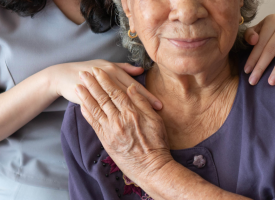Dr Bartone - RN Breakfast - Age of Criminal Responsibility
Transcript: AMA President, Dr Tony Bartone, RN, Breakfast with Fran Kelly, Monday, 25 March 2019
Subject: AMA Call to Raise Minimum Age of Criminal Responsibility; Medicare Rebate Freeze
FRAN KELLY: The AMA has joined a growing number of human rights and legal groups calling for the minimum age of criminal responsibility to be raised to 14 years. Currently, children as young as 10 can enter the justice system, and every year, about 600 children below the age of 14 end up in prison. Seventy per cent of them are Indigenous Australians. So that's kids who should be in, what, Year 4, Year 5, ending up in prison. The AMA says incarceration at an early age leads to recidivism and poor health outcomes later in life, including premature death.
Dr Tony Bartone is President of the AMA. Tony Bartone, welcome back to Breakfast.
TONY BARTONE: Good morning, Fran.
FRAN KELLY: Why is the AMA, why are the doctors getting involved in this call for an increase to the minimum age of criminal responsibility?
TONY BARTONE: As you've clearly outlined already in your opening, this is a multifactored issue in terms of health and wellbeing, and understanding the reasons why this cohort of young Australians are ending up in, unfortunately, incarceration. It's understanding that there's often a significant degree of family issues, of health issues, that impact on their reasons, on the property orders, on the court orders that they fail to understand or adhere to, and end up in an environment which is not conducive to dealing with the issues underlining, and then also to ensure that they can be part of society into the future. And of course, increased rates of violence, poor education, poorer health outcomes, and these are all reasons to speak out and join the chorus of other health groups - including the United Nations Special Rapporteur on Indigenous Health - that basically has recognised that this is an unfair and an unacceptable situation to continue.
FRAN KELLY: As you say, the AMA is not the only one to call for this, and the UN Special Rapporteur has done that a couple of years ago and there is still no change. But just to zero in, to stay with the health consequences of what the AMA in your statement describes as “a vicious cycle of disadvantage” - kids as young as 10 years behind bars, by the age of 14 probably perhaps entrenched in the criminal justice system. What is the day-to-day impact or the, sort of the short- I mean we've talked about premature death, what is the cycle in health terms, Tony, that would bring us to that?
TONY BARTONE: So, first of all, while they're incarcerated, they're not getting the access to the care that they need. Because there's often underlying health issues - either we're talking about FASD or otitis media or other health concerns -
FRAN KELLY: [Talks over] That's foetal alcohol syndrome.
TONY BARTONE: Yes, absolutely, sorry, I shouldn't use acronyms on radio. But it's important to understand that there's a need for care and attention. And they're not going to get that and that only then reinforces, or while they're being exposed to the violence and the inappropriate conditions in jails, it only reinforces the negative outcome. So they're not getting the access, they're not getting the attention that they need to deal with their health issues, but also to rehabilitate to a more appropriate form of social coexistence and [indistinct].
FRAN KELLY: The stats are clear, if we look at the 10 to 14 age group, there's massive overrepresentation of Indigenous and Torres Strait Islander children in that group of kids being locked up in that age group. State and Federal Attorney-Generals are undertaking a 12-month review. It was a recommendation of the Royal Commission into juvenile justice in the Northern Territory that this age of criminal responsibility be raised. Why is the AMA proposing 14 years as the age?
TONY BARTONE: Around the world, Australia has one of the lowest ages - 10 is by far the lowest stage that I'm aware of. In most other jurisdictions, it's between 12 and 14. There are moves, even in neighbouring jurisdictions where it's 12, to move up to 14. It's about understanding that the ability to have the appropriate access to care and intervention really is critical and it needs to be delivered in the appropriate framework, which is not jails.
FRAN KELLY: You're listening to Breakfast, it's 17 minutes to nine. Our guest is Dr Tony Bartone, President of the AMA. Tony Bartone, we're almost in a Federal election campaign. The Opposition Leader, Bill Shorten, will today promise that Federal Labor, if elected, would end the freeze on the Medicare rebate to doctors one year early. That would include items like mental health consultations, chronic disease management plans, urgent after-hours care. Does the AMA welcome that?
TONY BARTONE: Absolutely. We welcome it. The freeze should never have been there in the first place, and bringing it forward a year earlier is a recognition that otherwise this is going to put additional costs, out-of-pocket costs, on patients or, on where these were being bulk billed, putting continual pressures on the doctors who are supplying those visits.
FRAN KELLY: So is the corollary to that, is if the indexation freeze has meant that doctors have had to pass on extra costs, that once the freeze ends those costs will stop being passed on?
TONY BARTONE: We need to also recognise that in addition to the freeze, there's been a significant amount of disinvestment over the best part of the decade or more. We need to recognise that health is a significant concern for the average Australian, it really is top of mind as we lead into an election cycle, and we need to recognise that people are living longer, getting older, having more complex and chronic disease. That means that they need more care and of course health costs are going to go up for a government that needs to provide that. But we need to have a forward-thinking plan about how we're going to manage that, not just next year and the year after, but into the future. How we're going to intervene to change the trajectory of the health expenditure and of health outcomes and to see to a healthier Australia.
FRAN KELLY: In terms of the trajectory, I'm sure the Coalition Government would point out that health spending has only gone up, it's not gone down. And the Coalition will announce today for instance - I think they're signalling a $500 million health package will be fully announced before the election - but $80 million today to the Peter MacCallum Cancer Centre in Melbourne. Would the AMA welcome a health-spending contest between the major parties?
TONY BARTONE: A contest that really clearly articulates a vision, that shows the pathway to investment, not just in one part or another part, but across the whole health system and shows how we can improve, continue to improve outcomes ahead of the curve better than the rest of the world. We've got one of the best healthcare systems in the world, we need to ensure that we continue to deliver that for patients and for Australians. That's what we'd welcome and we'd happily love to see health being made a first order issue between both parties as we lead into the election.
FRAN KELLY: And I think you can count on that. Tony Bartone, thank you very much for joining us.
TONY BARTONE: Thank you very much.
25 March 2019
CONTACT: John Flannery 02 6270 5477 / 0419 494 761
Maria Hawthorne 02 6270 5478 / 0427 209 753
Follow the AMA Media on Twitter: http://twitter.com/ama_media
Follow the AMA President on Twitter: http://twitter.com/amapresident
Follow Australian Medicine on Twitter: https://twitter.com/amaausmed
Like the AMA on Facebook https://www.facebook.com/AustralianMedicalAssociation



